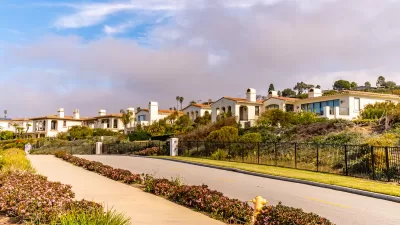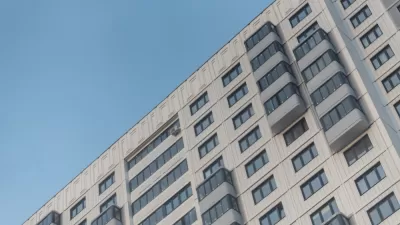A "white supremacist" law that blocks public housing in the state is up for repeal—again.

California leaders hope that in 2020, voters will agree to remove a barrier to public housing construction that has been enshrined in state law for 70 years.
That barrier is Article 34 of the California Constitution, which triggers a popular vote before public housing is built—a requirement unique to California. In a feature for the Los Angeles Times, Liam Dillon details how the amendment has not only diminished California's supply of affordable housing over the decades, but also hindered desegregation efforts throughout the state; shaped policy and finance around housing development; and led to a U.S. Supreme Court ruling that government could legally discriminate against poor people.
State Senator Ben Allen and Los Angeles Mayor Garcetti are among the leaders now pushing to abandon Article 34—calling the rule "anachronistic" and "white supremacist," respectively. If the measure appears on the ballot, it would mark the fourth time voters have been asked to repeal the law since it was first approved in 1950.
So far, it's never come close. But lawmakers hope that 2020 will be different. The last few years have seen voters support multiple tax increases and bond measures to fund affordable housing—and become increasingly likely to say yes to housing subject to their approval.
FULL STORY: A dark side to the California dream: How the state Constitution makes affordable housing hard to build

Alabama: Trump Terminates Settlements for Black Communities Harmed By Raw Sewage
Trump deemed the landmark civil rights agreement “illegal DEI and environmental justice policy.”

Planetizen Federal Action Tracker
A weekly monitor of how Trump’s orders and actions are impacting planners and planning in America.

Why Should We Subsidize Public Transportation?
Many public transit agencies face financial stress due to rising costs, declining fare revenue, and declining subsidies. Transit advocates must provide a strong business case for increasing public transit funding.

Understanding Road Diets
An explainer from Momentum highlights the advantages of reducing vehicle lanes in favor of more bike, transit, and pedestrian infrastructure.

New California Law Regulates Warehouse Pollution
A new law tightens building and emissions regulations for large distribution warehouses to mitigate air pollution and traffic in surrounding communities.

Phoenix Announces Opening Date for Light Rail Extension
The South Central extension will connect South Phoenix to downtown and other major hubs starting on June 7.
Urban Design for Planners 1: Software Tools
This six-course series explores essential urban design concepts using open source software and equips planners with the tools they need to participate fully in the urban design process.
Planning for Universal Design
Learn the tools for implementing Universal Design in planning regulations.
Caltrans
Smith Gee Studio
Institute for Housing and Urban Development Studies (IHS)
City of Grandview
Harvard GSD Executive Education
Toledo-Lucas County Plan Commissions
Salt Lake City
NYU Wagner Graduate School of Public Service





























